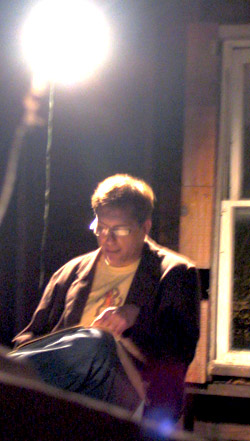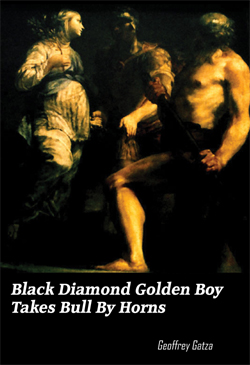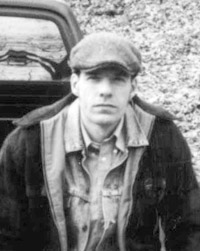
Richard Owens
reviews
Black Diamond Golden Boy Takes Bull By Horns
by Geoffrey Gatza
BazeVOX [books] 2007. Paperback. 156 pages. ISBN: 1-934289-41-8
This review is about 6 printed pages long. It is copyright © Richard Owens and Jacket magazine 2007.
1
To hold any one of Geoffrey Gatza’s books is to hold an object which invites and delights, which brings us pleasure through an intellectually driven but slapstick brand of humor. Like that of the New York School, Gatza’s humor does not negate the seriousness of his project. Rather, his humor underscores the gravity of the work, deceptively drawing the reader into textual matrices that willfully confuse myth and the real, forcing us to rethink the peculiar way in which myth and representation act in concert to shape the real.
2
Take Dreadful Quietude, a series of what Gatza loosely refers to as “cantos.” The number of each canto corresponds to a year in the twentieth century such that the first line of Canto 88 tells us George W.H. Bush is elected president, just as Canto 36 tells us F.D.R. is elected president and the WPA is introduced. Embedded among these facts we find any number of characters real and imagined: Superman, Lex Luthor, Thomas Carlyle, Ty Cobb, Lyndon Johnson, Lois Lane, Jesse Owens. The subtitle of the book, A confused saturation of Pre 9/11 America & Superman, tells us somewhat chillingly that we ought to be reading the events of the past — especially past popular culture — politically and in relation to the present.

Geoffrey Gatza, Buffalo, September 2006
paragraph 3
Dreadful Quietude is not a collection of poems as such but, as the subtitle of the book suggests, a confused saturation of ideologically charged and highly destructive representations embedded in American consciousness. Weaving together images and text, Gatza calls our attention to the consequences of such representations, demanding that we tend to them, consider them, and respond thoughtfully — responsibly — to them.
4
In his latest work, Black Diamond Golden Boy Takes Bull By Horns, we are introduced to a similarly complex cast of characters both real and imagined: Ezra Pound, Merlin and his mentor Bleys, Percival, the Lady of the Lake, Andy Dick, the Fisher King, Edward Hicks and Sir Thomas Malory, among possibly dozens of others. Again we find the juxtaposition of myth and the real — perhaps even an eventual synthesis of the two. But the two are not confused as they are in Dreadful Quietude. Here myth and the real compliment one another in a dialectical, contrapuntal play of verses residing within the architecture of the seasonal cycle — that is, the book is comprised of five sections, each section corresponding to a season. Since there are five sections and not four, the season which begins the cycle is the same one that ends it.
5
We begin with winter. And in winter we begin with a choice: “setting (a)” which sees Merlin sitting cross-legged in a dark cave where he has been trapped or “setting (b)” where we find Pound confined to an officer’s tent in the US Army Disciplinary Training Center on a windy Pisa plain. Regardless of the choice we make, we find, as in the choose-your-own-way novels popular among adolescents in the 1980s, that each choice is, at bottom, the same choice. In other words, both protagonists — Merlin and Pound — are gripped with a crippling fear which each of them repurpose. Each of them compress their “fears and loneliness into an industrial diamond.” Rather than bring their work or journey to a grinding halt, each of them transform their fear and loneliness into something useful and productive. For the reader, however, things are different. The narrator tells us in no uncertain terms:
6
Our voices matter not a fig! There is no way in which you can believe in what our players wish to produce. We have an assortment of unbelievable characters for the modern stage. As ever, our American empire is expanding, collapsing. Our terror has made things a poet cannot undo, or should want to undo...
7
A few lines later Gatza presents the rationale for the choice he has offered us:
8
We are alone with our folktales and if you do not accept this silly magical myth then kindly substitute the tragedy of Ezra Pound’s mind melting in prison.
9
The myth Gatza refers to is his own recasting of Arthurian myth which foregrounds Merlin, Bleys, the Lady of the Lake and Percival. Drawing from a number of source texts which include Thomas Malory’s Morte D’Arthur, Alfred Tennyson’s Idylls of the King, and Chretien de Troyes Percival, Gatza reconstructs Arthurian myth through the language and cultural sensibility of the present moment.

10
But it is only in winter, in the first and last sections of the book, that we find Arthurian characters. These sections position themselves like bookends or formidable mytho-cultural walls in relation to the larger work, which ushers us through Spring, Summer and Fall by means of text and images that respond to and prop one another up. In Spring, the second section of the work, we encounter “The Language of the Birds,” where in urban environs
11
The Titan arum and stinkhorn mushrooms fake
the scent of decomposition, attracting insects
to aid in reproduction.
12
That it is the smell of death and decay which draws insects into the fold of reproduction is no small point. The smell of death in the natural world — a scent which signifies death but is not itself death — is set against the presence of death and destruction in our world, the world of urban sprawl, mass communications and information technologies:
13
We sat in traffic listening to the war progress.
There are more dead. It’s happening. We drive
By the gleaming UN. The barren construction
Site of the World Trade Center, a carrion crater.
14
From the site of destruction which attracts insects to aid in reproduction, we move toward the museum, what Gatza refers to as “the house of walking ghosts.” This house — the MOMA — stands not as a site of cultural production but as a site which, in a static state of powerlessness, can only point toward the making of art.
15
A symphony of sculpture slowly began, a dance of iron
Steel and plastics spun from the center. The framed art
Began to float merrily around in carrousels, while the media arts
Flickered the lights switches on and off again to make a
Homemade strobe. Duchamp waltzes with Picabia, Tristan
Tzara jumps up on an excited chair, “God and my toothbrush
are Dada and New Yorkers can be Dada too, if they are not
already.” C’est mon dada, to create certain human horrors
it could not be more like a war than a high school dance.
16
Cradled in the arms of every construction, every installation, every ready-made are the free-market horrors which draw the destruction of war and anxiety of a high school dance into the center of the same void, the same carrion crater. But each work of art is trapped in precisely the same void it points toward. “Finally,” says Gatza, “I realize why I’m told the dead sleep so well.”
17
Summer, for Gatza, is red — the red of stop signs, Carlos Williams’ wheel barrow, burning flags, and herring. Red is also the color of conflict and rage, the color of seeing in summer, of antagonism running riot. According to Gatza, “The ties that bind are red” in summer. Autumn, however, is a different moment, a contemplative moment which allows us to grab the impossible by the scruff of its neck and drag it into the realm of possibility. Here we enter into the Peaceable Kingdom —
18
I write with Edward Hicks in the forefront of my memory. His Peaceable Kingdom hangs in the Albright Knox museum of Buffalo, NY and has been a source of comfort to me since early childhood. The loose theme that girdles these poems into one, the same muse for Hicks, comes from the Book of Isaiah, Chapter 11....
19
If we turn to the King James’ Bible we find the kingdom in Isaiah is one where “The wolf also shall dwell with the lamb, and leopard shall lie down with the kid; and the calf and the young lion and the fatling together; and a little child shall lead them” (Isaiah 11.6). This space not yet fully realized is, in short, a peaceable kingdom and was, Gatza tells us, a popular subject among Quakers such as Edward Hicks since it spoke to the Quaker belief in pacifism and desire for peace on Earth.
20
Comedian Andy Dick — whom Gatza actually had a brief encounter with in Texas that nearly resulted in their arrest — enters into this autumn kingdom. Appearing beneath a photograph of Dick we find a passage from Isaiah 11.4: “and he shall smite the earth: with the rod of his mouth, and with the breath of his lips shall he slay the wicked.” Dick’s caustic humor becomes here a means of responding to those forces that would work against the construction of a peaceable kingdom. But Dick’s humor also works against itself, negating itself and, in the process, working against others such as Gatza himself, who tells us:
21
that fucking Andy Dick
took my favorite pipe
into the Austin evening;
tried to get us arrested
22
Dick, in a “coked out selfish frenzy,” does not slay the wicked with his venomous humor, but beckons them, calling their attention to the weed-packed pipe he and Gatza pass back and forth to one another. Here we see that autumn is not so much about a peaceable kingdom as it is a struggle to pass over stumbling blocks and move toward a peaceable kingdom. What is most important here is not so much achieving a peaceable kingdom as the desire for such a utopian space and we see this in “A Brief Poem for Kevin Thurston” —
23
Thanks for your kind invitation to cheer with literary Buffalo
Over a Sabers game, I hear we lost the game but not our spirit.
I did, in fact have to work that day, but your invite was so nice
Donna and I stopped over in the early hours past midnight!
24
For every game lost there is a next and utopia, for Gatza, resides not in winning it, or actually constructing it, but in the desire for it. This is a desire which, at bottom, galvanizes community and is, in itself, a gesture toward utopia by way of community. That Gatza locates so much of himself and his poetic production in Buffalo, New York calls our attention to the architecture of the work — that is, only a poet raised in such a cold and unforgiving city can find forgiveness in hope in an unending seasonal cycle which insists on beginning and ending in winter.
25
This, of course, carries us back into winter and the last section of the poem: “So This Is Happiness.” The section focuses on Percival of Gales and it is here that we encounter the Lady of the Lake, Jesu, Joseph of Arimathea, the Fisher King and a number of others. The section is “A Poem Marketed as a Play,” and as such we find a list of dramatis personae, stage direction and three acts punctuated by a closing epigraph drawn from Tennyson’s “Holy Grail.” Samuel Barber’s Adagio for Strings brings us into the first action. Our Lord and Savior Jesus Christ narrates at times like “a circus master of ceremonies.” We are told the Holy Grail, the thing which the wounded Fisher King guards, is simply the blood-soaked shroud of Turin:
26
The Grail itself is nothing more than a cloth my uncle Joseph gave My Mother... to wipe the sweat and blood off my dead face. I was one hell of a mess after those three hours. It was He pauses for a moment a relief to die.
27
If we turn back to the source texts — to Chretien de Troye’s Percival where the Fisher King first appears, and Malory’s Morte — we see that Gatza is synthesizing these tales and delivering them to us through the colloquial phrasing and normative syntactic formations specific to the present moment. In synthesizing these biblical and chivalric narratives and filtering them through the linguistic and cultural frame of the present moment, Gatza offers us the figure of Percival as a “man in and out of time.” Like Pound’s Odysseus, who is everyman and no man and who is able to escape the grasp of the Cyclops precisely because he is no man, Percival can move through and beyond the categories of time and space. He moves freely through the fiction of myth, through the freedom myth affords. But in the end, in the third act of winter, Percival is tempted in the wilderness — just as he is tempted in Book 14 of Malory’s Morte. In Gatza’s recasting of the narrative, however, Percival loses his virginity, his innocence. In the end he chooses his body over his soul and waits patiently to see what this decision yields. As stage direction indicates,
28
He raises his Spear over his head, expectant of grandeur to be summoned from the skies. A moment then two and then Percival loosens his hold and still holding his breath nothing happens...
29
It’s hard not to read the “Spear” Percival holds over his head as a phallic object marking the subordination of mind to body, intellect to desire. But just as the nothing which inspires Beckett’s Godot to continue waiting through nothing for a something which will most likely be a further nothing, Percival’s decision — a decision upon which he believes the weight of the world rests — does not yield tragic and irreconcilable consequences. This decision, like the nothing winter brings, yields a nothing which was always already there. But the value of the decision lies in the nothing it brings. Despite the propensity western culture continues to have for fetishizing innocence and purity, sacrificing such purity — if such a thing in fact exists — means nothing. Whether we choose myth or the real, Merlin or Pound, innocence or experience, mind or body, the results are curiously the same.

Richard Owens
Richard Owens has contributed to a previous issue of Jacket (issue 28). His work has also appeared in Skanky Possum, Kadar Koli, O Poss, BlazeVox, Big Bridge, Cipher Journal, and Origin (6th Series in memory of Cid Corman). Other work is due to appear in forthcoming issues of Aufgabe, Shearsman, and First Intensity. He lives in Buffalo where he is enrolled in the Poetics Program at the University at Buffalo and edit Damn the Caesars, a journal of contemporary poetry and poetics.
The Internet address of this page is http://jacketmagazine.com/34/owens-gatza.shtml